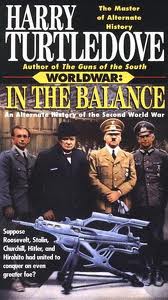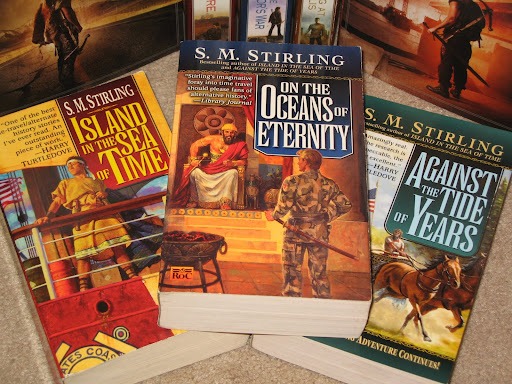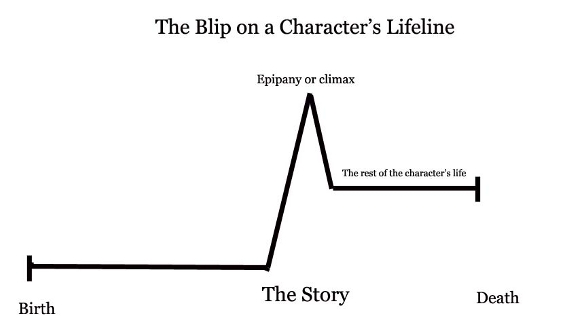I’m often asked to recommend a good alternate history book, but you might as well ask me to name my favorite film. My mind rebels at the thought of picking just one. For the sake of all the current and future alternate historians I will do my best to come up with a good list.
 Let’s start with Harry Turtledove. You just can’t go wrong with the “master of alternate history”. If you enjoy a specific point of divergence, he has probably written a book about it. I suggest you start by reading In the Balance the first entry in the four-book WorldWar series (and the first work of alternate history I ever read), where an alien race invades the Earth during World War II. The Colonization series and the epilogue novel Homeward Bound follow the series, but read those only if you read and enjoyed WorldWar.
Let’s start with Harry Turtledove. You just can’t go wrong with the “master of alternate history”. If you enjoy a specific point of divergence, he has probably written a book about it. I suggest you start by reading In the Balance the first entry in the four-book WorldWar series (and the first work of alternate history I ever read), where an alien race invades the Earth during World War II. The Colonization series and the epilogue novel Homeward Bound follow the series, but read those only if you read and enjoyed WorldWar.
Want something a little more plausible? Try How Few Remain the first of the Timeline-191 (or Southern Victory series), the epic eleven volume series where Special Orders 191 stayed out of the hands of Union soldiers, resulting in a Confederate victory at the Battle of Antietam and a victory in the American Civil War. Through multiple viewpoints, Turtledove describes how the two rival Americas competed and fought each other in the world wars of the 20th century, paralleling our European history (the Confederacy even gets their own Hitler).
 You should also try some of Turtledove’s stand-alone novels. First, Ruled Britannia, where we find a victorious Spanish Armada and a Catholic Britain chafing under Spanish occupation. Only the bard himself can win England’s freedom in a story mirroring Czechoslovakia’s liberation from communism. My personal favorite has to be In the Presence of Mine Enemies. Set in a timeline where the Axis won World War II, the story focuses on a German bureaucrat, his family and the secret they keep. Turtledove expertly manages the capture the “banality of evil” of Nazi Germany in this book. You won’t find monsters or comic book super-villains scheming to destroy the world. Instead we see regular people caught up in something horrible.
You should also try some of Turtledove’s stand-alone novels. First, Ruled Britannia, where we find a victorious Spanish Armada and a Catholic Britain chafing under Spanish occupation. Only the bard himself can win England’s freedom in a story mirroring Czechoslovakia’s liberation from communism. My personal favorite has to be In the Presence of Mine Enemies. Set in a timeline where the Axis won World War II, the story focuses on a German bureaucrat, his family and the secret they keep. Turtledove expertly manages the capture the “banality of evil” of Nazi Germany in this book. You won’t find monsters or comic book super-villains scheming to destroy the world. Instead we see regular people caught up in something horrible.
If you want to try someone who knows how to world build, I present the works of S. M. Stirling. Best known for Domination of Draka series, a four book series set in a world where the Loyalists of the American Revolution settled in South Africa instead of Canada. There they build an empire based on turning every non-Drakan into a slave. Not the most plausible work on this list, but the series makes the cut by being absolutely horrifying. You will find yourself cheering for the Nazis to beat the Draka in Marching Through Georgia.
Next we have the Nantucket trilogy, where an unknown event transports the island of Nantucket and a Coast Guard ship back to the Bronze Age. While some characters just want to survive in the past, others want to use their advanced knowledge to build an empire. The first novel in the trilogy, Island in the Sea of Time, influence in the genre can be found by the use of the title’s acronym, ISOT, by fans to describe any instance of time travel, whether by an individual or an entire nation. Stirling produced a parallel series called the Emberverse set on the Earth Nantucket left behind. If you enjoy a good alien space bat story and ever wondered what would happen when all the lights went out, you will enjoy the Emberverse. I must point out it has nothing to do with NBC’s Revolution.
Stirling has his own stand-alone novels I want to recommend. First we have Conquistador which features a conspiracy involving a parallel universe and a realistic portrayal of what someone and his buddies would do if they had access to their own alternate Earth. Next we have The Peshawar Lancers, a superb adventure tale where Stirling’s world building talents shine. In 1878, a heavy meteor shower devastates the northern hemisphere from the Ural Mountains to the Rockies. Millions perish, but thanks to Prime Minister Disraeli, Britain relocates its upper class and military to India, South Africa and Australia. More than a century later, the Angrezi Raj exists as the world’s most powerful empire, but the demon-worshiping, cannibalistic Russians scheme to destroy their rivals.
Besides the big two, I have other authors I want to feature in this guide. For series, read 1632 and its sequels by Eric Flint where the fictional town of Grantville, West Virginia ends up in Germany during the Thirty Years War. Flint opened the universe to other writers giving us almost a dozen full-length novels and a lot of short stories, all focusing on what time-misplaced Americans would do in the past. Viking fans (no, not the football team) should check out The Hammer and the Cross trilogy by Harry Harrison and John Holm. Follow the story of an English slave who becomes a king and unites Medieval Britain with the lands of the Norsemen. Or if you prefer the 20th century, check out The Children’s War and its sequel A Change of Regime by J. N. Stroyar set in a universe where Hitler never ordered the invasion of the Soviet Union. A little implausible, but it has an excellent message about human dignity and how the various resistance movements of World War II could have survived a German victory in Europe.
 For stand-alone novels, read Lest Darkness Fall by L. Sprague de Camp. Several alternate history authors name this novel as the inspiration for their own works. In this story a man finds himself in 527 AD and decides to help forestall the Dark Ages by sharing knowledge from his own era. You should also read The Yiddish Policemen’s Union by Michael Chabon set in a world where the United States allowed Jews fleeing Hitler’s Germany to settle in Alaska. In my opinion it features some of the best dialogue found in the genre. Meanwhile, nuclear war enthusiasts should read Resurrection Day by Brendan Dubois. Our protagonist works in a world where the Cuban Missile Crisis went hot leaving a world with a devastated Soviet Union and an increasingly fascist United States struggling to contain an increasingly unhappy population.
For stand-alone novels, read Lest Darkness Fall by L. Sprague de Camp. Several alternate history authors name this novel as the inspiration for their own works. In this story a man finds himself in 527 AD and decides to help forestall the Dark Ages by sharing knowledge from his own era. You should also read The Yiddish Policemen’s Union by Michael Chabon set in a world where the United States allowed Jews fleeing Hitler’s Germany to settle in Alaska. In my opinion it features some of the best dialogue found in the genre. Meanwhile, nuclear war enthusiasts should read Resurrection Day by Brendan Dubois. Our protagonist works in a world where the Cuban Missile Crisis went hot leaving a world with a devastated Soviet Union and an increasingly fascist United States struggling to contain an increasingly unhappy population.
I also need to give credit to Alison Morton for recommending these following novels, each of them having more in common with mainstream literary despite their settings. Through them the authors examined social, cultural and political events in a realistic alternate history scenario. First we have Fatherland by Robert Harris. This classic alternate history features a murder mystery where our hero stumbles onto a horrible secret deep inside the Third Reich. Next we have Pavane by Keith Thomas which features several personal short stories set in another post-Armada, Catholic England. Finally we must not forget The Alteration by Kingsley Amis where in a world without the Reformation, a young boy may lose something important. In these books we do not find troop movements or global politics, but normal people living their lives and making tough decisions.
Up until now I have discussed character driven narratives, but what about fake textbooks? These books focus more on crafting a well-researched, plausible scenario. Take For Want of a Nail by Robert Sobel, where the Americans lose the American Revolution. The British established the Confederation of North America over their North American colonies, while unrepentant rebels flee to Jefferson (Texas) where they later seize control of Mexico and form the bilingual United States of Mexico. It even comes complete with fictional footnotes to in-universe historians and books. For a more recent example see When Angels Wept by Eric Swedin. Another Cuban Missile Crisis divergence, where an alternate version of Swedin describes the events leading up to the crisis and how a change in the weather forced world leaders to make drastically different decisions resulting in the death of millions.
I could go on and on, but I think I have given you a good list to start with. If you want more examples of alternate history I recommend three sites. First, check out Uchronia: The Alternate History List, an online database of over 3000 alternate history titles. It’s managed by the same guys who run the Sidewise Awards for Alternate History, so they have a pretty good idea what counts as good alternate history. Second, Wikipedia has a long list of alternate history books, series, anthologies, short stories and other works of alternate history. Finally, you should check out my alternate history blog, Alternate History Weekly Update, specifically the Book Review list where you can see what I and other contributors have to say about old and new works of alternate history.
Hopefully my recommendations will help you find an alternate history book to enjoy, but remember to not just to take my word for it. If you see something interesting, try it. Treat all books as portals to alternate dimensions and you might be pleasantly surprised with what you discover on the other side.












Great! I’m just about done Guns of the South. I think I may pick up a Stirling next.
So many wonderful Alternate History books have been written, and you've done a decent overview here. The first Alt Hist novel I ever read was the classic BRING THE JUBILEE by Ward Moore (premise: what if the South had won the American Civil War?). A wonderful novel. Two other Harry Turtledove short series are worth mentioning: his Atlantis books (the English discover Atlantis, not America) and the two-volume End of the Beginning books (If Japan had followed the Pearl Harbor bombing with a land assault and occupied the Hawaiian Islands). Good grief, there are so many wonderful books out there in this genre.
Well I have made a grave omission. Bring the Jubilee is one of my favorite Civil War alternate histories but for the life of me I can't figure out why I left it out. Perhaps it was because I was focusing more on novel length works. Maybe in the future I will write a piece on short fiction.